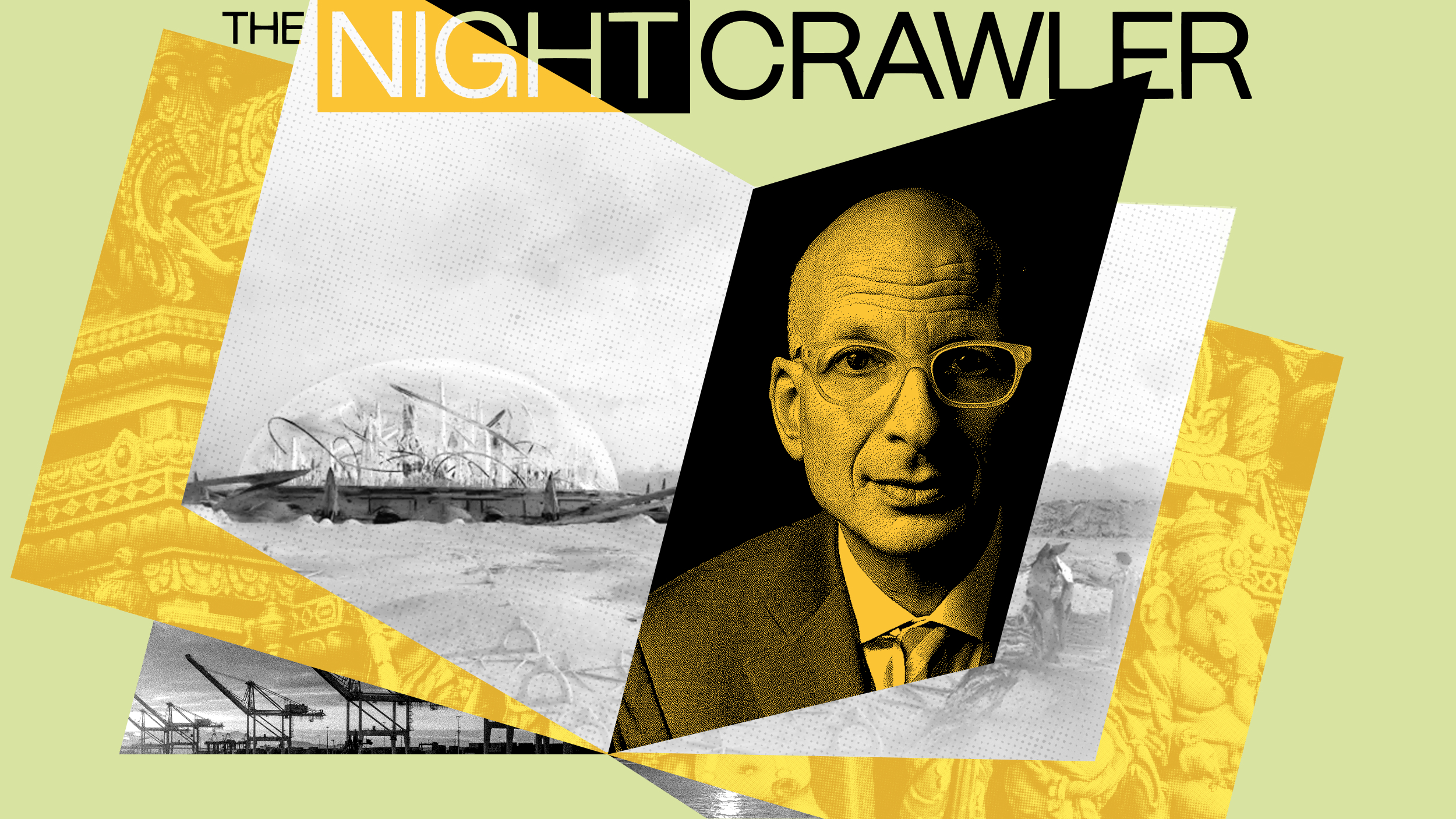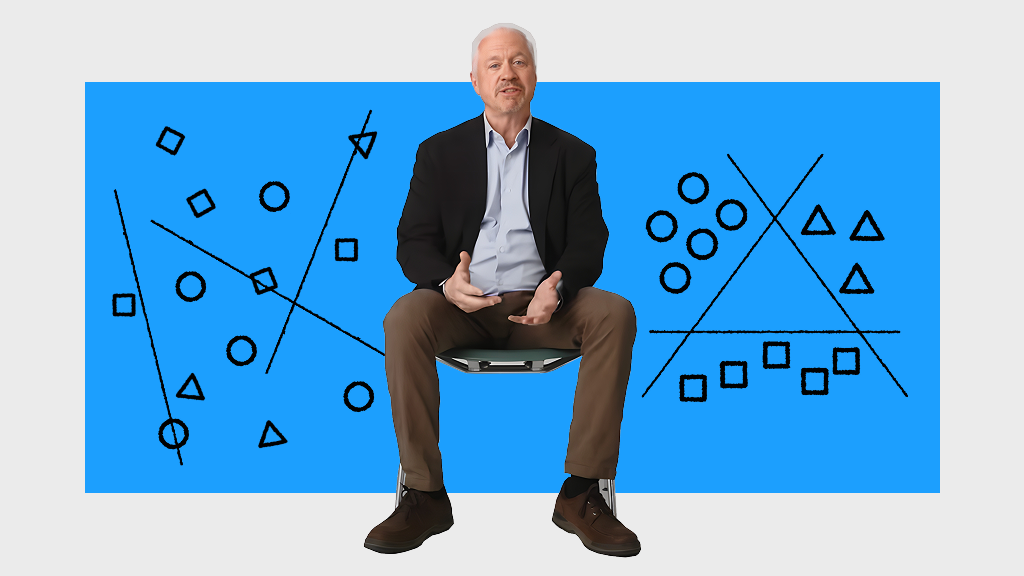Sign up for the Smarter Faster newsletter
A weekly newsletter featuring the biggest ideas from the smartest people
Philosophy and science haven’t always gone hand-in-hand. Here’s why that should change.
Daniel Dennett, an Emeritus Professor from Tufts University and prolific author, provides an overview of his work at the intersection of philosophy and science. Many of today’s philosophers are too isolated in their pursuits, he explains, as they dedicate their intellect purely to age-old philosophical ideas without considering the advancements of modern science. If our understanding of reality evolves with every new scientific breakthrough, shouldn’t philosophical thought develop alongside it?
In just 11 minutes, Dennett outlines the four eras he evolved through on his own journey as a philosopher: classical philosophy, evolutionary theory, memetic theory, and the intentional stance. Each stage added depth to his perspective and understanding, enriching his personal journey as a philosopher and his analysis of how philosophy, when used correctly, can help us comprehend human behavior.
Dennett’s key takeaway is a request for philosophers to reevaluate their methodologies, urging modern-day thinkers to embrace the insights offered by new scientific discoveries. By combining the existential and theoretical viewpoints of philosophers with the analytical and evidential perspective of scientists, we can begin to fully and accurately interpret the world around us. Maybe, with this type of collaboration, we can begin to answer the questions that started our intellectual pursuits in the first place, so many hundreds of years ago.
DANIEL DENNETT: If you see a magician sawing a lady in half and you wanna know how it's done, and somebody says, "Well, I'll tell you how it's done. They don't really saw the lady in half. They just make it appear that they're sawing the lady in half." And you say, "Yeah, okay, great. How do they do that?" "Oh, that's not my department. That's somebody else's job. I've already given you my explanation." Sometimes philosophers give answers like that. I think they just don't wanna be bothered. They don't wanna take on the responsibility to explain what's actually happening. What I like to do is explain things, and have them explained to me.
Mainly, explanations are about how things work, why they happen the way they do. So I've been curious about how philosophers arrive at the positions they arrive at, how scientists make mistakes when they frame their own questions. I have often said that philosophy is better at questions than at answers- and that's nontrivial. They don't think it's their job to understand how things actually work, whereas I think that should be the job of philosophers.
I'm Daniel Dennett. I'm the author of more than a dozen books on the mind, on free will, on evolution. And I'm an Emeritus Professor from Tufts University. Since I was a little boy, I wanted to know how things worked. I wanted to take them apart and see what made them tick, what made them work. So I was sort of an engineer at heart. And it turns out that that's not a bad attitude to have as a philosopher. Figure out what makes ideas work and why.
And so I've championed the idea that if you're gonna be a philosopher, learn about the world, learn about the science. I'm happy to say that now, philosophers who are scientifically trained way beyond what I ever was, is growing larger, and for the first time in my career, they're being taken seriously by the scientists. Because scientists are just as capable of making philosophical mistakes or getting into philosophical confusions as any laypeople. But they need the help of informed philosophers if they're gonna clarify those questions and ask better questions.
A lotta people just dig in, double down, and refuse to abandon a point of view which is under attack from their critics. That in itself is not a bad thing. I'm glad that my criticisms are resisted so resolutely and ferociously by some of those I criticize, otherwise, we'd never get at the truth. I think it's very important to keep in the back of your mind: 'What if I'm wrong?'
When I was a graduate student in philosophy way back in the '60s in Oxford, one day with a group of fellow graduate students, we got talking about what happens when your arm goes asleep and you can't control it. What on earth is that all about? And I got interested and started asking questions about: Well, what is it, is it the nerves? Do they get pinched? Is it blood flow? What is it? And they thought it was bizarre that a philosopher would be interested in the physiological questions of what was going on. They thought I was abandoning philosophy. I went off to the medical library and tried to get myself educated on how the nervous system works. And that was a main turning point for me.
It suddenly hit me when I learned about neurons, the cells of the brain that do the signaling, that they could be the basis for an evolutionary process in your brain, which was learning. That learning in the individual was just yet another Darwinian process. I didn't know much about evolution at the time, about natural selection, but I began to learn. And the more I learned, the more I thought, "This is the key. This is the great key to how things fit together." And we get rid of all the magic and we have a bottom-up theory of meaning and learning and truth and consciousness.
And I'm, to this day, amazed at how complacent so many philosophers are with their utter ignorance of evolutionary theory. They think that if we had a physiological, mechanistic, physical explanation of creativity, of genius, of understanding, that this would somehow diminish and demean these wonderful phenomena- not at all. If we understand how amazingly intricate and wonderful and ingenious nature is in allowing us to understand things and create things, think ahead, we would dismiss the magical ideas out of hand.
And I think that Darwin's ideas undo many of the biggest problems in philosophy, or at least, subvert them and turn them into better problems. And the fact that so many philosophers keep hammering away trying to find the essence of this or that, when Darwin has shown us that nothing of any interest has an essence; it's gradualism all the way. This is an idea that is just not dawned on a lot of philosophers, and for a very good reason. They learn from Socrates, from Plato. And the first thing they do is "define your terms," "establish the essence of each thing," as Aristotle would put it. And that turns out to be the great philosophical mistake. Forget about essences. Learn about all the variation and the details and the penumbral cases. Then afterwards, you'll know what you're talking about.
One of the most eye-opening moments for me was when I read Richard Dawkins' book "The Selfish Gene" and learned about his concept of memes. When Dawkins coined the term "memes," he had in mind something very general. The term caught on. It's in the dictionary now. But only a small subset are what most people think of as memes. And those are the ones that people deliberately and, presumably, intelligently design with the hopes that they'll go viral. And some of them do.
But lots of memes go viral that don't involve the internet at all. Words are memes. Every word in every language is a meme. It's not genetically inherited, it's culturally transmitted. They evolve over time. And Dawkins' theory was a very general theory of how human cultural evolution hugely expands the powers of a human brain. In fact, I would put it very strongly. I would say, the difference between a chimpanzee and a human brain is that the brain of a chimpanzee is largely unfurnished. Whereas we fill our brains with memes. We download hundreds of thousands of memes, and that's where we get our power from.
Your computer or your phone isn't a very powerful device until you download some apps to it. Those are like memes. We're awash in toxic memes right now. One of the most toxic, I think because it enables so many others, is the idea that truth doesn't matter, that truth is just relative, that there's no such thing as establishing the truth of anything. Your truth, my truth, we're all entitled to our own truths. That's pernicious, it's attractive to many people, and it is used to exploit people in all sorts of nefarious ways. The truth really does matter.
I think one of my best ideas is the "intentional stance," the idea that we automatically adopt the strategy of treating anything complicated and interesting, if we can, as an agent. What does it want? What does it know? What does it believe? We use the intentional stance all the time to endow other things that are moving and complicated with beliefs and desires,
and the ability to do the rational thing given those beliefs and desires. Well, that's fine, as long as we're living in a world of concrete objects.
But what's now happening is that AI is filling the digital world with fake intentional systems, fake minds, fake people, that we are almost irresistibly drawn to treat as if they were real, as if they really had beliefs and desires. And these will be very dangerous memes indeed, because they will replicate, they will evolve, and we won't be able to take our attention away from them. They will capture our attention and manipulate us.
The difference between current AI, large language models so-called, things like ChatGPT and GPT-4, is that their goal is truthiness, not truth. They are more like historical fiction writers than historians. We're different in that we take truth seriously. Maybe because we want to lie. But LLMs, AIs don't yet really have the capacity to lie on purpose. They do formulate falsehoods that they then spread. And there's only a difference of degree between us and them.
So we're not used to having our technology in the position to ignore the truth and just feed us what makes sense to them. Technology has gone to great lengths to make it very hard to make counterfeit money and quite easy to identify it. So we can do something similar for every phone, computer, tablet- every digital device can have software put in it which will do a pretty darn good job of detecting counterfeit people. And we'll not accept it or we'll brand it instantly: "This is fake, this is fake, this is spam, this is a hoax, don't believe it." And in order to do that, well, you have to have laws.
And in order to have laws, you've got to have governments, legislatures, that will pass the laws, and they have to know enough about what they're doing so they pass laws that aren't easily circumvented. This is something we have to work on now, and I think we need to work on it full-time.







